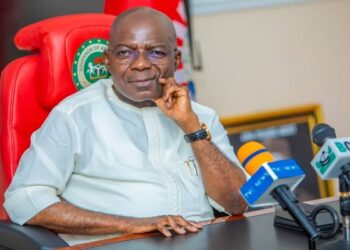Governor Charles Soludo of Anambra State has called on Ndi Anambra and the broader Igbo community to return to the core values of hard work, enterprise, and integrity—principles that historically shaped their identity and economic success.
Speaking during the presentation of his three-year scorecard at a town hall meeting in Lagos on Saturday, Soludo emphasized that the path to sustainable wealth lies in diligence and enduring enterprise, not in the allure of sudden riches, and stressed that reclaiming Igbo pride and dominance in commerce and industry requires a return to “first principles.”
“We are known for our painstaking, long-term approach to wealth creation,” the governor said. “The time has come to reject the culture of sudden wealth and rekindle our tradition of training, enterprise, and honest prosperity.”
Igbo Apprenticeship Model Under Threat
Soludo lamented the decline of the famed Igbo apprenticeship system, which he described as a unique model of mentorship and empowerment. Under this scheme, successful business owners train young apprentices—often their future competitors—and provide them with startup capital upon completion.
Regrettably, he said, many young people in Anambra now shun this path in pursuit of wealth through illicit means such as internet fraud, ritual practices, and kidnapping. Meanwhile, youths from other states are adopting the apprenticeship system and thriving.
Prudent Economic Management and Refusal to Borrow
On Anambra’s economic front, Soludo reiterated his administration’s commitment to fiscal discipline and resource optimization, and revealed that the state has spent only 65 per cent of what was expended in 2013—without borrowing a single naira since his assumption of office.
“We are doing more with less,” Soludo said, noting that the state is also steadily reducing its inherited debt profile. He further disclosed that he rejected a recent World Bank loan of N44 billion because it failed to meet his strict criteria: it must be concessional and tied to specific projects.
Massive Infrastructure Push and Sky Train Project
Highlighting the administration’s infrastructure achievements, Soludo unveiled ambitious plans, including a $1.4 billion Sky Train project linking Onitsha, Nnewi, Ekwulobia, and Awka. A comprehensive feasibility study has been completed, with funding discussions ongoing.
However, he acknowledged that the project will require the demolition of approximately 6,000 buildings due to its alignment through built-up areas.
The project forms part of a long-term master plan for the state, which he said is expected to host about 38 million residents in the next 50 years. All Trunk ‘A’ roads are being gazetted and dualised to support this future population boom.
Urban Renewal, Road and Water Projects
Soludo listed other notable projects, including the restoration of peace and security through initiatives like the Agunechemba security outfit and Operation Udo ga chi. Urban renewal efforts have seen the award and flag-off of 700 kilometres of roads across all 21 local government areas, with 410 kilometres set for commissioning by his third anniversary.
The administration is also tackling erosion with control works ongoing in Ebenator, Nnobi, Ezi-Oko, Awka, and multiple sections of the Onitsha-Owerri Road. In the health and water sectors, five hospitals have been constructed in Anambra North, alongside urban water schemes in Awka, Otuocha, Nnewi, Obizi, and Greater Onitsha.
Boosting Industrialization and Power Supply
In a move to industrialize Anambra, Soludo disclosed that the government is pursuing Free Economic Trade status for a planned industrial city. Additionally, a private electricity meter manufacturing plant with a 1.4 million yearly capacity has been facilitated in Oraifite, further boosting local production and job creation.
A Clarion Call to Ndi Anambra
Governor Soludo ended his address with a passionate appeal to Ndi Anambra: “This is our moment. Let us invest at home, build at home, and protect our future. Our identity as a people of honour, hard work, and innovation must be restored.”










